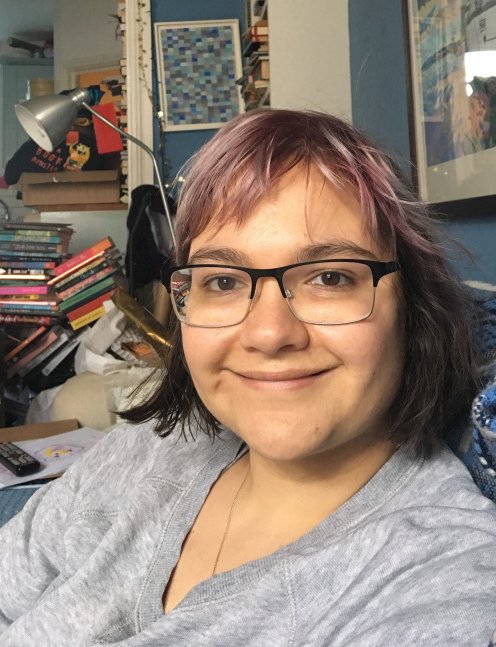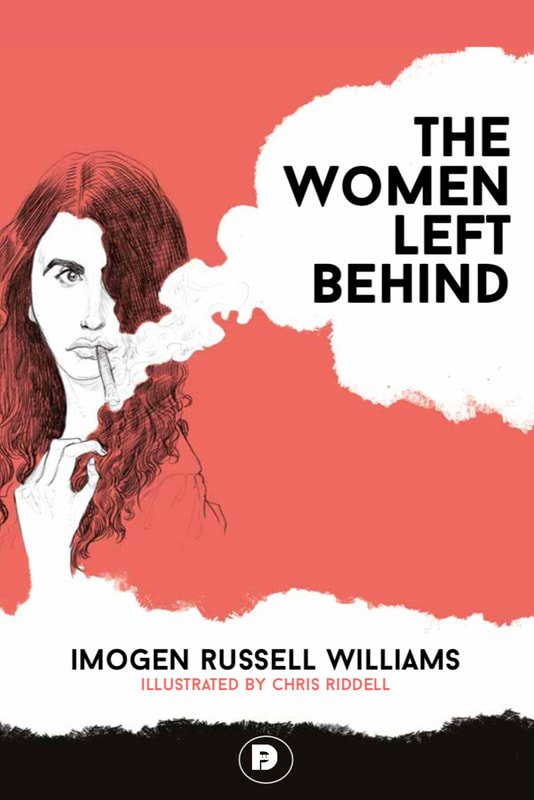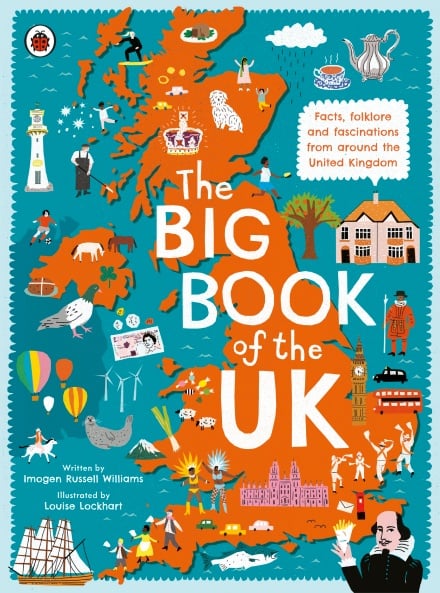
The Women Left Behind is one of our favourite collections of poetry for adults, so it’s wonderful to have Imogen Russell Williams join us today to talk about this important, beautiful collection of poems…
Without giving too much away, can you tell us a bit about The Women Left Behind?
Oh I’m worried about spoilers now! It’s a collection of – dramatic monologues, I suppose, from the points of view of women and girls who are left in limbo, or have really unsatisfying, hasty, ‘pat’ endings to their stories, in myths, fairy tales and canonical or famous literature.

What was your inspiration for writing The Women Left Behind?
I’ve always been a very passionate and involved reader, in that I often want to resolve stories I feel are desperately unfair – to reach into a book and rescue a character. It’s hard for me to stay dispassionate as a critic, in fact! I started out actually wanting to write a story or novella from the point of view of Flora, one of the two children in The Turn of the Screw, but it turned into a poem, and then I wanted to write more.
The anthology is illustrated by Chris Riddell. What was it like working with him? What do you feel his illustrations bring to the collection?
I was INCREDIBLY lucky when it came to the illustrations. I mentioned to Chris that I was working on this collection and he actually suggested that he would like to illustrate it! (I assumed he was joking at first, to be honest.) So I sent him my manuscript, and then these extraordinary images started pinging into my inbox!
Because some readers won’t be familiar with all my source material, or might have forgotten it, Chris’s illustrations perform a brilliant function – they give the reader a way in to the poem, making them instantly more accessible. But I think Chris is a fantastic illustrator for poetry in particular – he leaves a lot of space for the reader to think.
What research did you have to do when writing this book? Did you re-read all the myths and books again and try and frame them from a different perspective?
Not really. I did some rereading, but it was more to check that I wasn’t making any hideous errors (don’t tell me if you find any!) than to refine my responses. Almost all the women and girls came from stories or plays or poems I’d loved reading multiple times since I was a nerdy little girl myself – it was more just refreshing my sense of them, that was already quite bone-deep because I’d encountered them often.
Was there a ‘lost voice’ that you particularly enjoyed embodying in your poetry?
I have a soft spot for Sigyn, Loki’s long-suffering wife, and the idea that she might just want to hasten the apocalypse by now, rather than lessening the agony of a husband who’s let her down so badly and so often. I also like the ‘Half-Caste Woman’ in Kim. I’m mixed-race myself, and I have such a love-hate relationship with Kipling’s vision of India; I still want a stirring breakneck story of espionage and disguise in which a biracial girl is the hero, rather than the white boy who stains his skin brown just to wash it off when the time comes for him to be a ‘Sahib’.
I particularly liked ‘Eurydice’ which is based on the ancient Greek myth Orpheus – there’s a wonderful twist at the end which hints at a different side to the story based on Eurydice finally finding her own voice and independence. How did this idea come about?
I’m glad you liked Eurydice, she’s another of my favourites! I didn’t actually know the twist was going to happen until I’d been working on the poem for a long time. I knew she was going to make her own music in the ashy, shadowy Fields of Asphodel, rather than the Elysian Fields where the heroes lounge about, but it wasn’t until I’d found the metre and seen where it was curving back to that I realised she might have been more responsible that I’d thought for her own story’s ending.
Revenge is an important theme in this anthology, seen in the rather menacing ‘The Sisters’, which gives voice to The Little Mermaid’s once ‘laconic sea-girls’ who now plot ‘Death to he who stole you, sister’. How important was it to you to allow some of these ‘lost voices’ to react with anger and rage, as well as sadness?
Definitely important. Women and girls are still often encouraged not to react to injustice with anger, to bite their tongues and continue to smile – but injustice makes us all angry! And those sisters were tough ladies from the outset – they wanted the Little Mermaid to kill the prince, after all. If they’ve sacrificed their hair and still lost their sister, I don’t think it’s too much of a stretch to imagine they might wage war on any hapless human who enters their element.

I read and studied ‘Hard Times’ by Charles Dickens during my A-Levels and your take on Louisa’s perspective in the story very much altered how I thought about her. Do you think this anthology would be a good resource for secondary school teachers to use and what advice can you give them about using The Women Left Behind in their classroom?
I studied Hard Times for A-Levels too! I think I’ve had Louisa stuck in my mind like a thorn since then. I’m glad to hear my version changes the way you think of her – she is thoroughly dislikeable in some ways, but that image of ‘fire bursting out’ of the ‘languid and monotonous smoke’ of Coketown factory chimneys is just so arresting to me.
Ha – my first response (ridiculously) to the idea of The Women Left Behind in secondary schools is, ‘But it has so much swearing in it!’ In a way, though, I wrote it for teenagers and children who get put off poetry by the constant requirement to ‘break it down’, ticking off assonance, alliteration, metre etc, instead of being allowed to revel in it and invent their own. As a teenage pal of mine pointed out, my book is basically fanfic, and I wanted to say: feel free to make up your own versions of the canonical, to enter sacred landscapes and meddle with them. I think alternate versions or retellings sometimes help, too, in getting to grips with a difficult original (I would recommend Tanya Landman’s condensed retelling of Jane Eyre, for instance, for teenagers who are bogged down in Bronte.)
You obviously review children’s books for The Guardian – how do you think this helped you when writing this anthology? Was it scary thinking your work would now be reviewed?
I suppose reviewing helped in that I’ve had to get used to packing meaning into very small wordcounts! I was using a different part of my brain when I was writing this book, though – more fully submerged in creating, rather than consciously cross-referencing against things I’d seen before as I do as a critic.
It was very scary thinking people might review my book – I know from author friends that this is a hideous process! – but it was worse thinking no one would read it at all. I’m very grateful to everyone – not least The Reading Realm – who has been kind enough to read and tell me that they’ve enjoyed it.
Are there any children’s or YA books you’ve read and enjoyed recently which have really championed the strength, wit and bravery of girls and women?
There are so many! Unpregnant, by Jenni Hendricks and Ted Caplan, is an ‘abortion road-trip’ which you might not think sounds like a laugh a minute, but it’s hilarious, a warm and lovely portrait of female friendship and solidarity. I also like Rory Power’s Wilder Girls, a dystopia laced with body-horror that emphasises the tough loving bonds between teenage girls.
This slideshow requires JavaScript.
Do you have plans for a sequel to The Women Left Behind? I’d love to hear what Miranda from The Tempest might have to say and also perhaps some other forgotten fairy tale characters!
Every so often a woman pops into my mind and I think ‘Damn!’. I wish I could stick her in at the back on a Post-It note – the latest was Olga from Eugene Onegin, who gets a really bum deal. I don’t think I’d write another whole collection, though – I’m currently working on a series of responses to the medieval Welsh legends of the Mabinogion (of whom I already have Branwen and Blodeuedd in The Women Left Behind) and I’m hoping I can refine it to the point where it’ll work as a collection.
Finally, can you describe The Women Left Behind in three words?
Abandoned women revisited? Or maybe ‘foregrounding the forgotten’. Three words is hard!

